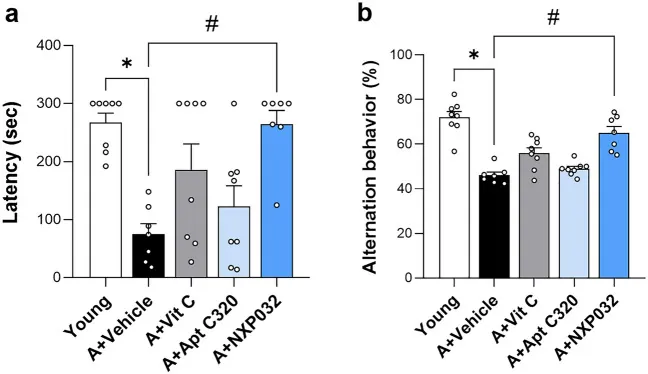Stabilized Vitamin C Improves Brain Aging in Mice
- The mice performed better on memory tests.

Korean scientists publishing in Nature were able to increase the stability of vitamin C, a powerful antioxidant, using a short, engineered DNA molecule called an aptamer. The result improved various aspects of brain aging in naturally aged mice [1].
The unstable antioxidant
Oxidative stress is one of the most harmful age-related processes. In particular, it damages the cardiovascular system, including microvasculature in the brain, leading to increased neuroinflammation and age-related neurodegeneration [2].
Vitamin C is a powerful antioxidant, but it’s relatively unstable, being quickly degraded in the body. Aptamers are short single-stranded molecules of DNA or RNA that bind to a specific target, including small molecules. The aptamer that this paper’s authors developed, Aptamin® C320, forms a complex with vitamin C, preventing its oxidation.
Improved cognitive function
The resulting aptamer-vitamin complex, NXP032, was given to aged mice for 8 weeks. At the end of the treatment, the researchers conducted two cognitive tests. In the passive avoidance test, mice with better memory and cognition are expected to spend more time (latency) before entering a part of the enclosure associated with previous negative experiences. In the Y maze test, cognitively normal rodents should prefer an unexplored maze arm to the one they have recently visited (alternation).
In both tests, old mice showed significant cognitive impairment compared to young controls. Both vitamin C and the aptamer alone produced some improvement (the latter probably by binding and enhancing vitamin C that was already present in the body), but unsurprisingly, NPX032 outperformed them, resulting in significant improvement almost to the level of young controls.

Better BBB, less microglia activation
This treatment was also found to protect the tiny blood vessels throughout the brain: its microvasculature. Levels of the protein PECAM-1, which is expressed by endothelial cells in blood vessels in the brain, were significantly higher in the study group compared to old controls, while fragmentation of brain microvasculature was significantly lower.
The brain is an extremely vulnerable organ that is isolated from the rest of the body by the blood-brain barrier (BBB), which prevents pathogens from entering the precious brain tissue. The expression of several BBB-associated proteins, impaired in aged mice, was significantly restored by the treatment.
Microglia, the brain’s resident immune cells, tend to become overactivated with age, which drives neuroinflammation. The treatment decreased the expression of two microglia-associated proteins to levels comparable with young controls.
Decreased blood flow and increased occlusion, two hallmarks of cardiovascular aging, contribute to the appearance of very thin blood vessels that are devoid of endothelial cells. According to the researchers, the prevalence of these “string vessels” was much higher in aged controls compared to younger mice but was partially rescued by the treatment.
The functional capacity of the brain gradually decreases during aging, resulting in decrements in learning and memory, attention, decision-making speed, sensory perception, and motor coordination. These aspects of cognitive decline are among the biggest health threats in old age and are manifested by a loss of brain function. Many animal experiments have reported that aged rodents have decreased learning and memory ability in the Morris water maze and elevated plus maze tests compared to young rodents. Consistent with previous studies, our study found that 20-month-old mice had impairments in spatial learning and memory, but the NXP032 group showed an increased spontaneous rate in the Y-maze test and a significant increase in the passive avoidance test. Based on these results, we confirmed that NXP032 can improve cognitive impairment due to aging.
Aptamers’ potential
Aptamers have numerous potential uses in medicine due to their ability to effectively and selectively bind to a wide range of targets, from small molecules to proteins. Many are currently being developed, and some have already been approved by the FDA, such as the aptamer pegaptanib [3], which is used against ocular vascular diseases. While NXP032 has not been approved for any indication yet, the FDA has recently granted it Generally Recognized as Safe (GRAS) status.
This particular study, as the researchers admit, had its share of limitations. First, in the aged mice groups, only female animals were used. This might have affected its comparison to the young control group, which was sexually heterogenous, since we know that male and female mammals can react differently to anti-aging therapies. Second, vascular damage and BBB integrity were measured via indirect markers. However, the idea of increasing stability of anti-aging compounds via aptamer binding has a lot of potential.
Literature
[1] Lee, J. M., Lee, J. H., Kim, S. H., Sim, T. H., & Kim, Y. J. (2023). NXP032 ameliorates cognitive impairment by alleviating the neurovascular aging process in aged mouse brain. Scientific Reports, 13(1), 8594.
[2] Liguori, I., Russo, G., Curcio, F., Bulli, G., Aran, L., Della-Morte, D., … & Abete, P. (2018). Oxidative stress, aging, and diseases. Clinical interventions in aging, 757-772.
[3] Ng, E. W., Shima, D. T., Calias, P., Cunningham Jr, E. T., Guyer, D. R., & Adamis, A. P. (2006). Pegaptanib, a targeted anti-VEGF aptamer for ocular vascular disease. Nature reviews drug discovery, 5(2), 123-132.








